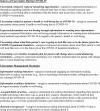Blood cancer caregiving during COVID-19: understanding caregivers' needs
- PMID: 34042962
- PMCID: PMC8194588
- DOI: 10.1093/tbm/ibab021
Blood cancer caregiving during COVID-19: understanding caregivers' needs
Abstract
The COVID-19 pandemic likely exacerbated caregiving challenges for caregivers of parents diagnosed with a blood cancer. Providing care during a public health crisis presents a complex web of uncertainties regarding cancer care, personal health, and COVID-19 risk. Identifying caregivers' uncertainty experiences during the COVID-19 pandemic can be a first step in learning where to direct resources or alter policies to ensure that they can not only perform their caregiver role but also cope in health-promoting ways. Using uncertainty management theory, this study explored how the pandemic has impacted adult child caregivers' experiences caring for a parent diagnosed with a blood cancer, as well as their experiences of uncertainty and uncertainty management. As part of a larger study on blood cancer caregivers' needs, a survey was administered from March 30 to June 1, 2020, to recruit caregivers through the Leukemia and Lymphoma Society. A qualitative and quantitative content analysis was conducted on open-ended responses from 84 caregivers. Caregivers described changes illustrating the complexity of providing care during a pandemic: (a) increased fears and uncertainty-related distress, b) reduced in-person care opportunities, (c) increased isolation, and (d) enhanced family communication. Caregivers with parents diagnosed with acute blood cancers used significantly more uncertainty management strategies and had more sources of uncertainty than caregivers with parents living with chronic blood cancer types. Findings highlight the need for supportive services to help caregivers manage uncertainty and improve their capacity to provide care in an unpredictable global health crisis. Such support may reduce poor psychosocial outcomes.
Keywords: Blood cancer; COVID-19; Caregiving; Uncertainty.
© Society of Behavioral Medicine 2021. All rights reserved. For permissions, please e-mail: journals.permissions@oup.com.
Figures
Similar articles
-
The health and well-being of caregivers of children with cerebral palsy.Pediatrics. 2005 Jun;115(6):e626-36. doi: 10.1542/peds.2004-1689. Pediatrics. 2005. PMID: 15930188
-
Family Caregivers' Experiences and Changes in Caregiving Tasks During the COVID-19 Pandemic.Clin Nurs Res. 2021 Sep;30(7):1088-1097. doi: 10.1177/10547738211014211. Epub 2021 May 17. Clin Nurs Res. 2021. PMID: 33998836 Free PMC article.
-
Qualitative Study of Chinese Stroke Caregivers' Caregiving Experience During the COVID-19 Pandemic.Stroke. 2021 Apr;52(4):1407-1414. doi: 10.1161/STROKEAHA.120.032250. Epub 2021 Feb 16. Stroke. 2021. PMID: 33588588
-
Remotely delivered information, training and support for informal caregivers of people with dementia.Cochrane Database Syst Rev. 2021 Jan 4;1(1):CD006440. doi: 10.1002/14651858.CD006440.pub3. Cochrane Database Syst Rev. 2021. PMID: 33417236 Free PMC article.
-
Challenges Experienced by Family Caregivers of Individuals With Severe Mental Illness During the COVID-19 Pandemic: An Integrative Review.J Psychosoc Nurs Ment Health Serv. 2023 Jul;61(7):21-28. doi: 10.3928/02793695-20230110-01. Epub 2023 Feb 1. J Psychosoc Nurs Ment Health Serv. 2023. PMID: 36720066 Review.
Cited by
-
Rural resilience during COVID-19: the lived experience of North Carolinian rural-dwelling cancer caregivers.Support Care Cancer. 2023 Jun 15;31(7):396. doi: 10.1007/s00520-023-07840-1. Support Care Cancer. 2023. PMID: 37318622 Free PMC article.
-
Health-Related Quality of Life and Treatment Satisfaction of Patients with Blood Cancer in Kazakhstan: A Cross-Sectional Study.Asian Pac J Cancer Prev. 2023 Jul 1;24(7):2397-2403. doi: 10.31557/APJCP.2023.24.7.2397. Asian Pac J Cancer Prev. 2023. PMID: 37505772 Free PMC article.
-
Biobehavioral Implications of Covid-19 for Transplantation and Cellular Therapy Recipients.Front Immunol. 2022 Jul 5;13:877558. doi: 10.3389/fimmu.2022.877558. eCollection 2022. Front Immunol. 2022. PMID: 35865530 Free PMC article. Review.
-
A Mixed-Method Examination of Emerging and Young Adult Cancer Caregivers' Experiences during the COVID-19 Pandemic.Int J Environ Res Public Health. 2023 Apr 17;20(8):5537. doi: 10.3390/ijerph20085537. Int J Environ Res Public Health. 2023. PMID: 37107819 Free PMC article.
-
Family Caregivers' Experiences during the COVID-19 Pandemic: Qualitative Study.Healthcare (Basel). 2024 May 8;12(10):970. doi: 10.3390/healthcare12100970. Healthcare (Basel). 2024. PMID: 38786382 Free PMC article.
References
-
- Bachner YG, Karus DG, Raveis VH. Examining the social context in the caregiving experience: correlates of global self-esteem among adult daughter caregivers to an older parent with cancer. J Aging Health. 2009;21(7):1016–1039. - PubMed
-
- N H, AM N, M K, D M, A B, M Y, et al.Bethesda, MD: National Cancer Institute; 2019.
-
- American Cancer Society. Cancer facts and figures 2019. Available at https://www.cancer.org/content/dam/cancer-org/research/cancer-facts-and-.... Accessibility verified October 30, 2020.
Publication types
MeSH terms
Grants and funding
LinkOut - more resources
Full Text Sources
Other Literature Sources
Medical
Research Materials



